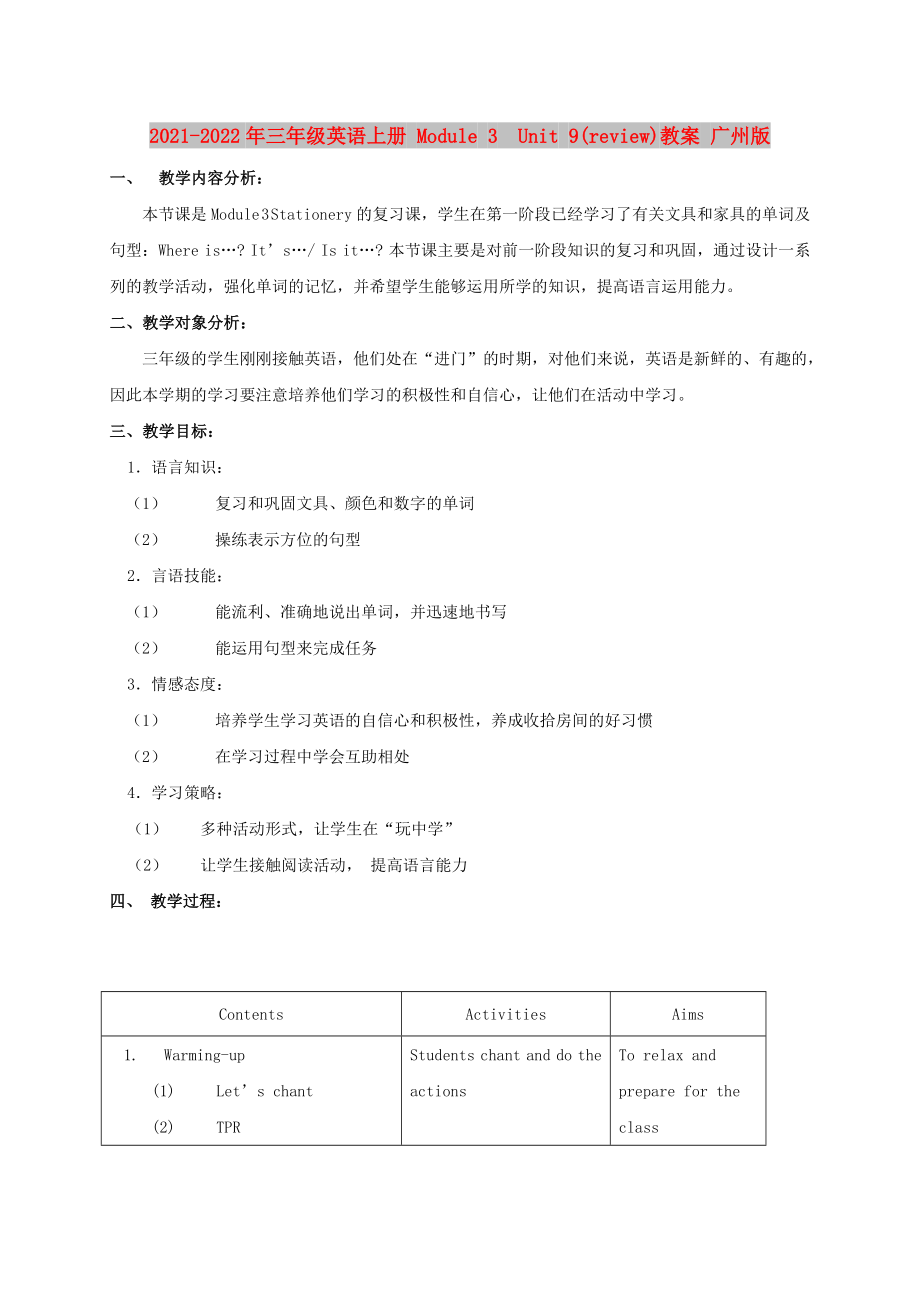《2021-2022年三年級(jí)英語(yǔ)上冊(cè) Module 3Unit 9(review)教案 廣州版》由會(huì)員分享����,可在線(xiàn)閱讀,更多相關(guān)《2021-2022年三年級(jí)英語(yǔ)上冊(cè) Module 3Unit 9(review)教案 廣州版(6頁(yè)珍藏版)》請(qǐng)?jiān)谘b配圖網(wǎng)上搜索����。
1、2021-2022年三年級(jí)英語(yǔ)上冊(cè) Module 3 Unit 9(review)教案 廣州版
一����、?教學(xué)內(nèi)容分析:
本節(jié)課是Module 3 Stationery的復(fù)習(xí)課����,學(xué)生在第一階段已經(jīng)學(xué)習(xí)了有關(guān)文具和家具的單詞及句型:Where is…? It’s…/ Is it…? 本節(jié)課主要是對(duì)前一階段知識(shí)的復(fù)習(xí)和鞏固����,通過(guò)設(shè)計(jì)一系列的教學(xué)活動(dòng),強(qiáng)化單詞的記憶����,并希望學(xué)生能夠運(yùn)用所學(xué)的知識(shí),提高語(yǔ)言運(yùn)用能力����。
二、教學(xué)對(duì)象分析:
三年級(jí)的學(xué)生剛剛接觸英語(yǔ)����,他們處在“進(jìn)門(mén)”的時(shí)期,對(duì)他們來(lái)說(shuō)����,英語(yǔ)是新鮮的、有趣的����,因此本學(xué)期的學(xué)習(xí)要注意培養(yǎng)他們學(xué)習(xí)的積極性和自信心����,讓他們?cè)诨顒?dòng)中學(xué)
2����、習(xí)。
三����、教學(xué)目標(biāo):
1.語(yǔ)言知識(shí):
(1)???復(fù)習(xí)和鞏固文具、顏色和數(shù)字的單詞
(2)???操練表示方位的句型
2.言語(yǔ)技能:
(1)???能流利����、準(zhǔn)確地說(shuō)出單詞,并迅速地書(shū)寫(xiě)
(2)???能運(yùn)用句型來(lái)完成任務(wù)
3.情感態(tài)度:
(1)???培養(yǎng)學(xué)生學(xué)習(xí)英語(yǔ)的自信心和積極性����,養(yǎng)成收拾房間的好習(xí)慣
(2)???在學(xué)習(xí)過(guò)程中學(xué)會(huì)互助相處
4.學(xué)習(xí)策略:
(1)??多種活動(dòng)形式����,讓學(xué)生在“玩中學(xué)”
(2)??讓學(xué)生接觸閱讀活動(dòng)����, 提高語(yǔ)言能力
四、 教學(xué)過(guò)程:
Contents
Activities
Aims
1.? Warming-up
(1)??
3、Let’s chant
(2)?? TPR
Students chant and do the actions
To relax and prepare for the class
2. Presentation
(1)?? Find and circle: review the words of colours and stationeries
(2)?? Play a card game in group
(3)?? Spelling game: ask the students to do some writing
(4) Game: (a messy room)
4、
Ask the students to practice the words of positions
(5) Guessing game: ask the students to guess the positions of the bee, using the sentence pattern “Where is…? It’s…/ Is it…?”
(6) Sing a song
Students find out the phrases as quickly as possible
Students spell the words of stationeries in
5、 group
Students write down the spellings of words
Students talk about the positions of things
Students practice the sentence pattern orally
Students sing a song
To remember the phrases of colours and stationeries
To remember the spelling of stationeries
To relax and for fun
6、To practice the sentence pattern individually or the whole class
To relax and for fun
3.????? Development
Listen to a paragraph and decide true or false
Students listen to a paragraph and read the sentences to decide true or false
To review the language points
Homework:
1.?????
7����、recite Unit7 and Unit 8
2.????? dictate the words of unit 7 and unit 8
3.????? finish the exercise
課后反思
本課是對(duì)Module 3 Stationery 的復(fù)習(xí)和鞏固,根據(jù)三年級(jí)學(xué)生初學(xué)英語(yǔ)����,興趣比較濃厚,把單詞和句型的練習(xí)結(jié)合到不同的活動(dòng)中去����,讓學(xué)生在“玩中學(xué)”。
在設(shè)計(jì)學(xué)習(xí)活動(dòng)時(shí)����,得到了彭老師的指導(dǎo):“設(shè)計(jì)學(xué)習(xí)環(huán)節(jié)時(shí),不是為了設(shè)計(jì)而設(shè)計(jì)����,而是要根據(jù)學(xué)生的特點(diǎn)����,而且是根據(jù)本班學(xué)生的特點(diǎn)來(lái)設(shè)計(jì)����?���!睘榇?���,根據(jù)本班學(xué)生單詞比較薄弱的情況,設(shè)計(jì)了三個(gè)關(guān)于單詞和詞組的環(huán)節(jié)����,并且不單單
8、是這個(gè)單元的單詞����,還結(jié)合顏色這個(gè)單元����,把它們編成詞組來(lái)記憶����。在課堂上����,學(xué)生學(xué)習(xí)的積極性很高,他們都喜歡這個(gè)新鮮的環(huán)節(jié)����,達(dá)到了預(yù)期的目標(biāo)����。
但是這節(jié)課也有不少遺憾的地方,如:在設(shè)計(jì)活動(dòng)����,運(yùn)用句型“Is it…?”時(shí),由于過(guò)于沉湎在上面的一個(gè)環(huán)節(jié)����,所以學(xué)生沒(méi)能好好地操練����,只是重點(diǎn)掌握了關(guān)于方位的句型����;由于第一次上公開(kāi)課����,所以不自覺(jué)就依賴(lài)好的學(xué)生����,沒(méi)有關(guān)注好中下生;在最后一個(gè)環(huán)節(jié)����,閱讀練習(xí),學(xué)生第一次接觸����,在如何更好地開(kāi)展方面還需要不斷改進(jìn)。
附送:
2021-2022年三年級(jí)英語(yǔ)上冊(cè) Module 3 Unit 2 Point to the desk 教案 外研版
教學(xué)目標(biāo)
知識(shí)與技
9、能 目 標(biāo)
1. 學(xué)生能夠聽(tīng)說(shuō)認(rèn)讀新單詞 desk chair
2. 能借助圖片聽(tīng)懂課文����,并會(huì)運(yùn)用正確的語(yǔ)音、語(yǔ)調(diào)來(lái)認(rèn)讀課文。
熟練的運(yùn)用句型: Point to … .
3學(xué)唱歌曲: 《Please stand up 》
過(guò)程與方法 目 標(biāo)
1. 通過(guò)借助教室內(nèi)實(shí)物的學(xué)習(xí)達(dá)到對(duì)新單詞的聽(tīng)說(shuō)認(rèn)讀
2. 通過(guò)聽(tīng)錄音,生模仿自主練習(xí)達(dá)到對(duì)課文的正確朗讀
情感、態(tài)度與價(jià)值觀 目 標(biāo)
讓學(xué)生體驗(yàn)學(xué)習(xí)英語(yǔ)的興趣����,體會(huì)生活中處處有英語(yǔ)����。
教學(xué) 重 點(diǎn)
學(xué)生能夠聽(tīng)說(shuō)認(rèn)讀新單詞desk chair
能借助圖片聽(tīng)懂課文,并會(huì)運(yùn)用正確的語(yǔ)音、語(yǔ)調(diào)來(lái)認(rèn)讀課文����。
教學(xué)
10、難 點(diǎn)
運(yùn)用正確的語(yǔ)音、語(yǔ)調(diào)來(lái)認(rèn)讀課文。
學(xué)唱歌曲: 《Please stand up 》
所用 課 時(shí)
1課時(shí)
教學(xué)過(guò)程
備注
Step1 : 熱身與導(dǎo)入 Warm –up and lead in
Play a game : I say, you do.
T: Stand up./ Sit down./Point to the desk.(引領(lǐng)學(xué)生指桌子,進(jìn)而導(dǎo)出
本節(jié)課課題Point to the desk.)
(設(shè)計(jì)意圖:通過(guò)動(dòng)作的示范����,既調(diào)動(dòng)了學(xué)生的積極性,在復(fù)習(xí)上節(jié)
課內(nèi)容的基礎(chǔ)上順利導(dǎo)出本單元課題)
Step2 : 出示目標(biāo) Show
11����、 the aims
1.學(xué)生能夠聽(tīng)說(shuō)認(rèn)讀新單詞 desk chair
2.能借助圖片聽(tīng)懂課文����,并會(huì)運(yùn)用正確的語(yǔ)音����、語(yǔ)調(diào)來(lái)認(rèn)讀課文����。
熟練的運(yùn)用句型: Point to … .
3.學(xué)唱歌曲: 《Please stand up 》
Step3: 課文學(xué)習(xí) Text learning
In Moudle3 u1 , we know Ms Smart says three orders. What are they?
S:Point to the door/ blackboard/ window . Today let’s look at part
U
12、2.
師提前出示問(wèn)題:
1. Who are they ?
2. 聽(tīng)大明發(fā)了哪些指令����?
聽(tīng)課文,回答;
3. 1.師運(yùn)用教室內(nèi)實(shí)物 desk chair對(duì)單詞
進(jìn)行教讀����,然后優(yōu)生領(lǐng)讀單詞,男女生比賽讀單詞
單詞操練
I say����,you point. (我來(lái)說(shuō),你來(lái)指)
I point����,you say. (我來(lái)指,你來(lái)說(shuō))
4. 跟讀課文����。
2. Part 2 : 整體感知����、認(rèn)讀課文
(1) 第一次聽(tīng)錄音,初步感知課文����。
T:Listen to the tape and answer What can you see?
師預(yù)設(shè)(Daming Sam w
13����、indow door desk chair point)
(2) 第二次聽(tīng)錄音����,教學(xué)生找出文中指令。
(3) 第三次聽(tīng)錄音����,讓學(xué)生跟讀并模仿其中的語(yǔ)音、語(yǔ)調(diào)����。
(4) 師領(lǐng)讀
(5) 小組內(nèi)讀,每個(gè)學(xué)生充當(dāng)一個(gè)角色Daming Sam Amy Lingling
師巡視指導(dǎo)����,重點(diǎn)輔導(dǎo)每組4號(hào)
(6) 分角色朗讀,生表演����,每個(gè)學(xué)生充當(dāng)一個(gè)角色Daming Sam
Amy Lingling
( 7) 游戲鞏固
同學(xué)扮演成小鳥(niǎo)����,發(fā)指令����。
Step 4: Sing a song .
1. Listen to the song .
2. sing follow
14、 the tape .
Step5: 小結(jié)(讓學(xué)生說(shuō)說(shuō)本節(jié)課學(xué)習(xí)了什么����,師加以補(bǔ)充說(shuō)明)
Step6達(dá)標(biāo)題: homework
導(dǎo)學(xué) M3u2
板書(shū)設(shè)計(jì):
M3 Unit2 Point to the desk
1. Words: window, blackboard, bird, desk, chair.
Sentences:
Point to the… window!
Point to the… door!
Point to the… desk!
此處運(yùn)用游戲教學(xué),加深學(xué)生印象����。
(充分發(fā)揮學(xué)生的
主題地位調(diào)動(dòng)學(xué)生的積極性)
教學(xué) 反思
 2021-2022年三年級(jí)英語(yǔ)上冊(cè) Module 3Unit 9(review)教案 廣州版
2021-2022年三年級(jí)英語(yǔ)上冊(cè) Module 3Unit 9(review)教案 廣州版

